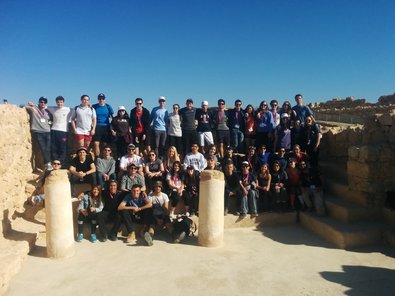 Today we awoke at the crack of dawn...literally. Breakfast was served at 6:30; it was an assortment of fresh cheeses and breads, jelly, eggs, cereal, and the like. We watched the sunrise as we ate, illuminating the clear desert sky into vivid colors of blue. After breakfast, we headed down to where the camels were kept and paired off, since there were two seats per camel. After putting on our helmets, we hopped onto the camels' backs. Mati and I were partners, and I took the back. The camel lurched its rear end upwards (where we sat), and then picked its head and neck up afterwards. The camels were tied together, and Freddy, my camel, reluctantly brought up the rear. The camel ride was definitely one to remember. Though only around 20 minutes in total, it was one of the most fun experiences. Freddy was unhappy that he was the caboose of the train, so he decided that he would continuously nudge Jesse Alloy, who was in front of me. They became fast friends. Jesse's camel decided to gobble up a huge mouthful of slop and dirt from the ground, and make hilariously gross chewing motions and noises. After the camel ride, we embarked on our journey west. The bus ride took about an hour and a half, on which a group of us played Liar's Poker and a group of us played Heads Up (similar to charades). We passed through much of the Negev, the views of which were surprisingly beautiful. Arid, but hilly and rocky, desert surrounded us in all directions. We traveled snaking roads that climbed the hills, and barely saw any other cars, because let's face it, who else would be driving at 8:00 in the morning through a barren desert? All of a sudden, out of nowhere, we turned a corner and BAM! the Dead Sea came into view. It was breathtaking. The blue color of the sea contrasted with the tan sand, against a backdrop of Jordanian mountains. On the way to the Dead Sea, we stopped at the bottom of a mountain: Masada (מץדה). We took the easy, short way up the mountain on the Roman Ramp. We hiked it in only 15-20 minutes. We came to the top of the fortress and it opened up to a large area. It was honestly unbelievable that this place had been inhabited thousands of years ago by Jews who fled from the Romans. The abbreviated version of the tragedy of Masada is this: Herod the King built the original palace on top of the mountain as a safe haven where he could flee, if and when the Jews rose up against him. He died, the Romans eventually took over, and drove out the Jews. However, a group of zealous Jews, called the Sicarii, opposed the Roman rule and were forced up the mountain as the Romans pursued them. The Romans laid siege to the mountain for over a year with the best legions they had, yet the mighty Sicarii staved them off until their gate was eventually burned down. Seeing their end was in sight, the Sicarii decided that being captured by the Romans was a fate worse than death. Thus, the 960 Sicarii killed each other with their sicae (small daggers) in a mass suicide as a last noble move. It was said that even the Romans were in awe of the Sicarii's bravery. Hearing about the history of Masada as we stood atop the mountain, gazing at where our noble, brave ancestors had once dwelled, filled me with a sense of pride for my people. Our people had held off the most powerful army in the world with strength and courage. At the top, we also got to gaze at one of the most *beautiful* views I've ever seen in my life: the Negev ending at the Dead Sea, and the Dead Sea ending at the base of a Jordanian mountain range. We took a zillion pictures, and then headed down the other side of the mountain on the Snake Path. The name was aptly given, as the path was the most curvy, rocky path ever. The sun beat down on us as we trekked down the mountain, but the heat was refreshing, since the last week had been brisk, rather chilly weather. After making it to the bottom, we got on the bus and made our way to the International Beach at the Dead Sea. Our group split in two: one group ate first and the other went swimming in the Dead Sea. The Dead Sea is the lowest point on Earth (1400 feet below sea level) and one of the Seven Wonders of the natural world. If the Snake Path at Masada was aptly named, the Dead Sea is even more aptly named, since it is nearly impossible for anything to live there. Though, some microscopic life forms have recently been found near the bottom of the sea. The salt content is astonishing. Beaches were lined with salt near the water instead of sand, and the bottom of the sea is pure salt. I put a drop on my tongue to taste, and quickly realized why Chelly told us not to, haha. Its 34.2% salinity was certainly noticeable. We walked into the icy sea and reluctantly sat down to embrace the cold water. It was truly remarkable that one can just float there (due to the salt). We kicked our feet up and could've floated there for ages. The craziest part was when I tried to stand up. I stood completely straight, and my feet didn't touch the bottom, nor did I even start to sink at all. I just floated there. It is said that masses heavier than cars can even float in the Dead Sea. It is hard to describe the feeling of just floating in water that you know you should be sinking in. After we had had our fair share of floating, we quickly rinsed off, ate a fast lunch (or snacks), and got back on the bus to head to Ashkelon. The bus ride took about an hour or so, and on the way we slept and played Heads Up again. We checked into the Holiday Inn in Ashkelon, and took the most wonderfully cleansing showers ever. The Holiday Inn is certainly the nicest off all the hotels we've stayed at. Balconies overlook the Mediterranean Sea (now we are at 0 feet above sea level haha), and the hotel itself is just very clean and elegant. We lit the Shabbat candles and made our way to the beach (about a 1-2 minute walk), where we spent the time reflecting and meditating on our week and what it means to rest. As we pondered this, we got to watch the sunset over the Mediterranean, creating gorgeous color schemes in the sky. Reds lined the horizon, and gradually turned into the dark navy and black of night. The moon shone brightly against the perfectly clear sky. The sunset provided a beautiful background for our naming ceremony, a time when anyone could select a new Hebrew name for themselves, in addition to the one they may had already been given at birth. It is said that we all have three names: one given to us at birth, one that our friends call us, and one that we give ourselves. We talked about how Jacob had wrestled with an angel in biblical times, and ultimately was shown the blessing of knowing his own name. Four of us participated in the ceremony, and the rest of us cheered them on. Afterwards, we had time before dinner to relax, so a group of us hung out downstairs in the lobby. Some chatted and some played a game called Secret Stalin, one of the most intense games of persuasion and wit I have ever played. We had also played this late last night in the Bedouin tent. Then, we had dinner at the hotel, where we ate from a really delicious buffet. It included fish, chicken, multiple kinds of beef, every Israeli or Mediterranean salad possible, rice, couscous, a salad bar, and a large dessert bar. One of the most refreshing parts of Israel, for me, is the fact that I never have to question whether or not I can eat the meat; there is never pork or shellfish, since everything is kosher. We ended the night at the oneg upstairs, where we played games and ate snacks. Halava, gummies, and dried fruit were passed around. We played a game called Look Up (led by Tallulah), Telephone (led by Ally) and Bang (led by Saskia). It was immensely fun—in part because I won Bang in an epic showdown against Aviv, our security guard. The rest of the night was on our own, and tonight we have the luxury of sleeping in tomorrow morning since it is Shabbat. After a long day of fun and excitement, the 10th day of our trip has come to an end, and I, for one, am exhausted. I can't wait to see what the next two days have in store for us! --Ethan Handler 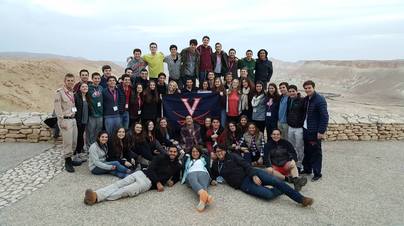 Yesterday we departed our beautiful hotel in Jerusalem and headed towards Mt Herzl. While there, we visited the gravesites of Theodore Herzl, Shimon Peres, and American Lone Soldier Michael Levin, along with many other men and women who dedicated their lives to the creation and preservation of the State of Israel. Following our trip to the National Military Ceremony, we ventured back to Machaneh Yehuda for lunch and shopping in the market. After enjoying delicious rugelach from Marzipan Bakery, we were on our way out of Jerusalem and into the Negev, the largest desert in Israel. Before heading to the Bedouin tents, we stopped at Sde Boker, a beautiful view and the final burial site of first Prime Minister David Ben-Gurion. Finally, we arrived at our tent and enjoyed a Hafla-style dinner in traditional Bedouin fashion. We took a short walk into the desert and had a thought-provoking discussion about our relationships with G-d. After finishing up programming for the day, we taught our Israeli friends how to make smores and enjoyed eating our treats by the campfire. We packed into one giant tent and enjoyed the rest of our night together. It was another day of learning a lot, forming stronger relationships, and dreading the ending of this incredible experience. -- Hayley Katzenstein 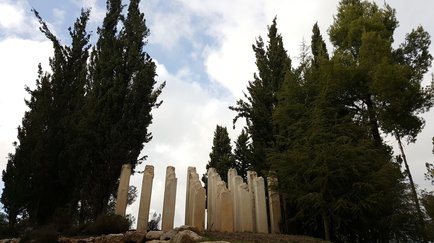 Today we were all taken on a roller coaster of emotions. The day began with a tour of the local YMCA, which focuses on being inclusive of all three monotheistic religions. We learned about the "triangle" that the YMCA is founded on: body, spirit, and mind. Correspondingly, we saw the gymnasium, which was the first wood-floored basketball court in Israel, followed by the chapel, which was notably lacking any specific religious symbols but rather focused on loving everyone as you would family. Finally, we learned about the bilingual (Hebrew and Arabic) preschool and kindergarten the YMCA offers. It was quite inspiring to see how the organization put so much effort into creating a non -political place for children and families of different backgrounds to interact with each other. We then shifted gears and had a discussion as a group about how we personally relate (or don't relate) to the Holocaust. Many people shared their viewpoints, and it was nice to hear the different stories and experiences we have all had. After the preparatory conversation, we headed to Yad Vashem, the Holocaust museum in Jerusalem. We ate lunch first, then were led on a guided tour by a man named Hershy. We all learned a lot of facts about WWII, though towards the end we got a little rushed and had to quickly walk through the remaining parts of the museum. Many of us were especially moved by the Children's Memorial, which honors the 1.5 million Jewish children who perished in the Holocaust, as well as by some of the video footage in the museum. Discussion about what we saw would have to wait until later, as we were off to hear a lecture by Avraham Infeld, a South African Jew who moved to Israel after high school and is now a renowned public speaker. He told us 3 stories about his life, described to us 4 reactions medieval Jews had when invited to assimilate (yes, no, yes except for religion, or seeing Judaism as a form of nationalism), and told us the five "legs" of Judaism. These were: collective memory, a sense of family, interpretation of Mount Sinai, a relationship to the land/state of Israel, and the Hebrew language. The idea is that if every Jew has at least 3 of these that are important in their life, then Jews will always remain connected to each other in some way. Though the transition from Yad Vashem to Avraham was a bit abrupt, most of us enjoyed his humorous and engaging lecture. We returned from the lecture to the hotel where we ate dinner, then watched a film as a group about a granddaughter learning about her grandfather's experience in the Holocaust. Following the film, we were finally able to unpack the day. There were many mixed emotions on all of the events today, as is to be expected. However, many people shared and everyone was respectful, which allowed those sharing to be honest and even vulnerable in sharing reactions to today. Tomorrow we will leave Jerusalem. It is bittersweet to be saying goodbye to such a beautiful city, but we are all very excited for the remaining days of our adventure here in Israel. - Wittney Skigen 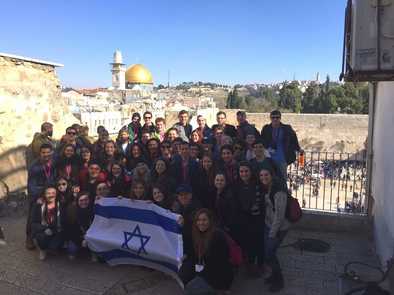 Hello everyone back home! We had an important day today. To begin, the organization Stand With Us presented the context of the modern state. The presentation provided a lot of information, including a 3,000-year-old history of Israel, as well as the current political climate. A major takeaway was that Israel is in a tough situation, and the future is unsure. After, we entered the old city for the first time. Despite the political outlook of Israel that we were presented with in the morning, the city of Jerusalem is alive and well. Upon seeing the Western Wall, we recited the shecheyanu, a blessing that expresses gratitude for having reached this moment in time. The celebration was completed with grape juice and challah! To conclude the small service, we rejoiced and danced and sang Hatikvah - the Israeli national anthem that expresses the hope for self determination. The experience showed we maintain hope, just like the generations before us who were never even able to stand at this wall. Despite, the complexity of the conflict, we must hold onto our hope for a better future if we wish to see it realized. - Matt Keitelman 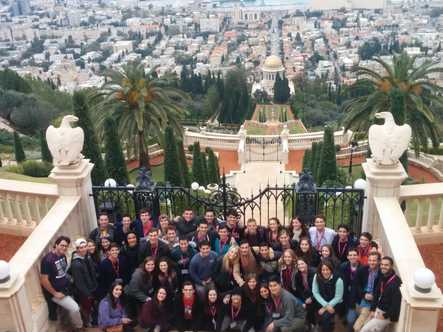 This was our first jam-packed day, between saying goodbye to our first Israeli home at Kibbutz Ma'agaan, learning about the historic significance of Tzipporah, deepening our understanding of diversity in Haifa, and arriving at our hotel in Jerusalem. Not only did we have a lot to do today, but this excursion also gave us much to think about in establishing a relationship with Israel and understanding what life here is like for all citizens. For me personally, hearing about the hub of difference found in Haifa was incredibly powerful, although it further complicated my connection to Israel. We listened to our tour guide speak of Haifa as a place of escape for refugees from all sorts of persecution and exclusion. Then, we visited a representative of the Ahmadiyya Muslim community who spoke about his religion and values. While the majority of our conversation with him was engaging and interesting, the one statement that has not been able to leave my mind has been how he does not see Haifa as representative of all of Israel. After hearing stories of the acceptance shown towards people of difference in Haifa (even with an understandable level of conflict), as well as a conversation and reflection as a group about difference, today has been a very personally challenging one. It started with feelings of love and appreciation for what I had seen in Israel and the land's history, but it transformed into a day of questioning my own values and wondering whether I can work through all of these new perceptions of what Israel truly is. -Alex Levin 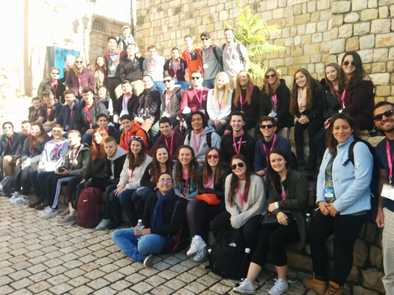 After about a million years of traveling, we finally arrived at Ben Gurion Airport right outside of Tel Aviv. The flight itself was pretty fun. Most of us slept a few hours at least, Steven had the only outlet that had charging capabilities, and we very much enjoyed dressing up Noah while he was asleep. For many, it was a bit of a culture shock to see many Jewish passengers on the plane go to the back of the plane at sunrise to daven, and so that was a little introduction to some Jewish culture we were not necessarily accustomed to before. At about 8:30pm Israel time, we were finally on our way to the north to the Kibbutz. We stopped for some delicious Israeli barbeque on the way. There were appetizers of pita bread with lots of things to stuff it, as well as shish kabob including chicken, beef, and cow liver which some of us were brave enough to try. Driving to the kibbutz it was hard to understand that we were halfway across the world. Everything was dark and we were on the highway so we didn't get to see much. After a yummy dinner we arrive at around 11:30 p.m,. got our room assignments and headed to our rooms. I was lucky enough to room with Saskia and Aviella, one of the six Israeli soldiers that completed our group. The three of us stayed up talking for a bit, took showers, and ended up going to bed at 2 a.m. we woke up on Friday at 7 a.m. and headed to breakfast. Breakfast with also very good with lots of yummy pastries and things that we don't normally eat for breakfast like red cabbage. We did an ice breaker event where we performed skits of the Israeli soldiers' lives and then we got on the bus to head to Tsfat. We took a short tour of the city, saw the alley way the Messiah was supposed to come up when he came from the mountain, and saw an old Ashkenazi synagogue. We proceeded to walk the streets of the nice City, and had some time to explore on our own and grab lunch. A few people and I ended up getting food from the oven. It was some of the best food as ever had! Up upon leaving Tsfat, we went to the abandoned Syrian outpost called Gadot. We learned more about the conquest from the 6 days war and stood on the land that Israel won in that war. Afterwards, we had it back home and rested until the Shabbat service at 4:30 p.m. The food ended up having for Shabbat was so tasty, of course, because it seems that all the food here is amazing. Now we are all going to meet up and talk about our days and bond some more. It has been in incredible experience in Israel so far and I can't wait to see what is the come. - Tallulah Tepper |
The Brody Jewish Center, Hillel at the University of Virginia, is the focal point in a renaissance of Jewish life for the 1,000 Jewish students on Grounds. Archives
September 2021
Categories
All
|
 RSS Feed
RSS Feed